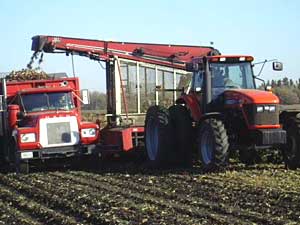|
Audio
Photos
More from MPR
Resources
|
August 5, 2005
 |
| Sugar beet farmers in the Red River Valley fear their crop will be worth less money because CAFTA allows more sugar imports from other countries. (MPR file photo) |
Moorhead, Minn. — CAFTA eliminates tariffs with Costa Rica, El Salvador, Guatemala, Honduras, Nicaragua and the Dominican Republic.
Bob Worth, president of the Minnesota Soybean Growers Association, says he's happy the trade agreement is now law. Worth says it provides soybean farmers with new opportunities.
"We have to export 45 percent of our soybeans, because we cannot use them in our state," says Worth. "So anytime we have a trade agreement to a foreign country, we think it's fantastic for soybean farmers."
Worth says he's confident that once U.S. farmers have access to the Central American countries, they'll have more customers, and larger profits.
But sugar beet growers don't see it that way. Nick Sinner, who heads the Red River Valley Sugarbeet Growers Association, says the new markets in Central America aren't as lucrative as some people think.
"It's a small market. It's roughly the size of New Haven, Connecticut -- about two-thirds of the size of the Minneapolis-St. Paul market," says Sinner. "The economic impact is not huge."
Sinner says the U.S. sugar market is already adequately supplied. He says the additional imports allowed under CAFTA will hurt sugar beet farmers.
"You've got the 109,000 tons that can come from the CAFTA agreement, you've got the 276,000 tons that can come in from Mexico," says Sinner. "You bring that much additional sugar into the United States, that's going to depress our market."
Sinner expects once trade begins under CAFTA, sugar beet farmers will see prices drop.
"Which is going to impact the profitability of all the farmers, which is going to trickle down to the main street businesses," says Sinner. "It's going to affect the ability of some farmers to stay on the land."
Sinner says sugar beet growers are nervous these days. As a group, they're not optimistic CAFTA will benefit them. Sinner says the CAFTA debate has reinforced an important lesson -- farmers must be politically active. He says the association is already preparing for future battles on trade issues.
Others are looking for ways to offset the expected drop in sugar prices.
Won Koo, director of the Center of Agriculture Policy and Trade Studies at North Dakota State University in Fargo, says sugar beet growers have a limited number of options to prepare for a depressed market.
"We may produce ethanol from sugar. By doing that we may be able to maintain our domestic price," says Koo. "Our second option may be to simply reduce our domestic production."
Koo says it will be difficult for sugar beet farmers to move into the ethanol business, since that market is dominated by corn growers. He says it will be just as hard to convince farmers to reduce production.






